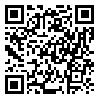Volume 20, Issue 77 (5-2021)
QJCR 2021, 20(77): 122-140 |
Back to browse issues page
Download citation:
BibTeX | RIS | EndNote | Medlars | ProCite | Reference Manager | RefWorks
Send citation to:



BibTeX | RIS | EndNote | Medlars | ProCite | Reference Manager | RefWorks
Send citation to:
bakhtyari E, hosseini S, arefi M, بختیاری ا. The Mediating Role of Marital Intimacy in the Relationship between Attachment Style and Couples' Attitude Towards Infidelity. QJCR 2021; 20 (77) :122-140
URL: http://irancounseling.ir/journal/article-1-1100-en.html
URL: http://irancounseling.ir/journal/article-1-1100-en.html
Dept. of Psychology , Islamic Azad University, Kermanshah Branch,Kermanshah, Iran
Abstract: (11397 Views)
Aim: Intimacy among couples is an important factor in sustainable marriages. If couples' intimacy fades, it will affect their tendency toward extramarital relations. Individuals' style of attachment form during childhood and exert a notable influence on the formation of their marital intimacy during adulthood. Therefore, the goal of the present research was to study the mediating role of marital intimacy in relation between attachment styles and attitude of Methods: This research is a descriptive-analytic study of correlational type. The statistical population is comprised of all married men and women of Tehran in the Iranian year of 1396. The study's sample was chosen from the population using the convenient sampling method. Data collection tools included Mark Whatley (2006) Q Attitude Toward Transnational Relationships Questionnaire, Collins & Read (1990) Attachment Style Questionnaire, and Thompson and Walker (2002) Marital Intimacy Questionnaire. The total population size of the sample was 650 couples, consisting of 357 women and 293 men. Data analysis was done using the path analysis method and the AMOS statistical software from SPSS company. Results: Analyzing the correlation coefficients and their standardized values, in addition to the related t-test values, indicated that the direct effect of the anxiety-driven attachment style on marital intimacy is meaningful (P≤0/05). Furthermore, the indirect effect of marital intimacy on tendency toward infidelity is meaningful (P≤0/05). Conclusion: Since marriage and choosing a partner is one of the most important decisions in life, considering the predicting role of unsafe attachment style and the role of marital intimacy in individuals' tendency toward infidelity, the necessity of analyzing these two variables as it applies to premarital counseling and parental training about child education and attachment styles, must be emphasized.
Type of Study: Research |
Received: 2019/05/19 | Accepted: 2021/03/9 | Published: 2021/05/11
Received: 2019/05/19 | Accepted: 2021/03/9 | Published: 2021/05/11
Send email to the article author
| Rights and permissions | |
 |
This work is licensed under a Creative Commons Attribution-NonCommercial 4.0 International License. |





